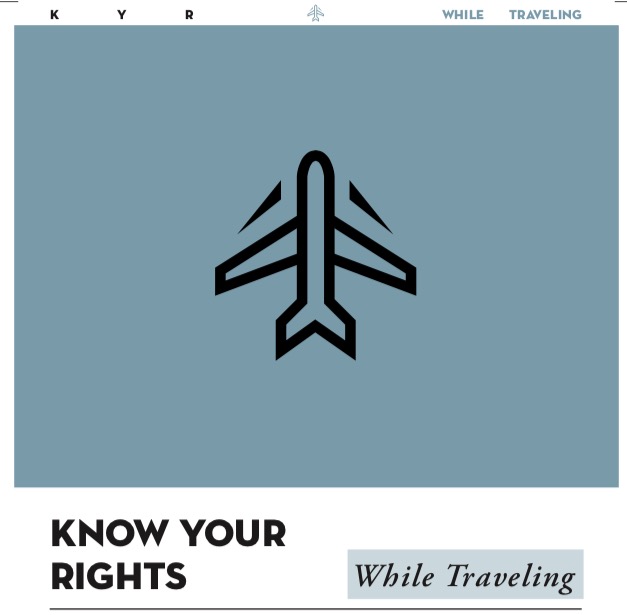
25 Nov, 2019
Multi-Language Guidebook to Confront anti-Muslim bigotry by Travel Security Officials
WASHINGTON, D.C., 11/22/2019) – The Council on American-Islamic Relations (CAIR), the largest Muslim civil rights and advocacy organization in the U.S., today published its “Know Your Rights” materials online in English, Arabic, Somali, Urdu, Farsi, Bengali, and Bosnian. CAIR’s online booklets offer civil rights advice for students, travelers and employees, as well as for those who encounter law enforcement authorities or are targeted by hate crimes.
“Those targeted by discrimination or bigotry often communicate most easily in a language other than English and therefore need access to advice about civil rights in their mother tongue,” said CAIR National Communications Director Ibrahim Hooper. Hooper added that the multi-language civil rights materials may be printed out for distribution at local events.
 |
 |
Click here to download: https://www.cair.com/KnowYourRights
The Washington-based organization also offers “Know Your Rights” workshops in which attorneys discuss protecting civil and religious rights.
CAIR’s mission is to protect civil rights, enhance understanding of Islam, promote justice, and empower American Muslims.
Travel Impact Newswire Executive Editor Imtiaz Muqbil comments: Why is this issue not on the agenda of international travel organisations and Islamic travel events?
Such guidebooks should be produced at a global level under the responsibility of international organisations such as the International Civil Aviation Organization, International Air Transport Association and others.
Over the last two decades, these organisations have devoted considerable attention to safety and security, nearly all of which has been directed at deploying expensive technological hardware. While this has boosted the revenue streams of equipment manufacturers, there is scant evidence it has made any difference at all to enhancing safety and security. Attacks continue unabated, exacerbated by the underlying geopolitical conflicts and tensions which feed public resentment and add fuel to the fire.
There is no public record of how many incidents of anti-Muslim racial profiling, discrimination and bigotry have occurred at airports and checkpoints all over the world. This does not include other factors such visa-refusals for which no explanation is ever given. Muslim travellers often also land up on opaque watch-lists.
The fact that there is neither accountability nor recourse for complaints only makes it worse.
The reasons for this blind spot are not clear, even though it is certainly serious enough to warrant a place on the agenda of international organisations. Apparently, discrimination against Jews and the LGBTQ community is unacceptable and deserving of condemnation, but bigotry, racial profiling and discrimination against Muslims is okay.
The fact that it is happening at the airports and checkpoints of the so-called developed countries is also noteworthy. These countries already impose stringent visa requirements on citizens of the so-called developing countries, and then face no accountability over the bigotry and racial profiling at their own borders.
Perhaps it is time for the many conferences on Islamic travel & tourism to start putting this issue on the agenda.
At the moment most of them stick to the traditional comfort zones — generating stock numbers to identify travel trends and spending power of Muslim millennials, female travellers, etc.
Perhaps a system that rates which countries are the worst in terms of anti-Muslim racial profiling and discrimination, accompanied by a name-and-shame monitoring and complaints mechanism, will help ensure that accountability becomes a two-way street.
A look at these three websites below will show that the International Civil Aviation Organization, a UN-affiliated agency, is investing heavily to ensure safety and security of international aviation through complex, technology-driven screening mechanisms, biometrics, passenger name records, Traveller Identification Programmes and more.
https://www.icao.int/Security/Pages/default.aspx
https://www.icao.int/Security/FAL/TRIP/Pages/default.aspx
Safeguards against racial profiling, discrimination and bigotry by safety & security personnel are not mentioned anywhere. Why not? If the ICAO claims it is not responsible for this, who is?
Bigotry, discrimination and racial profiling are human rights violations, unacceptable under the UN agenda. Simply throwing more hardware at the problem without an equivalent focus on check-and-balance software makes no sense.
I mentioned this several times to Mr Mario Hardy, the “bold and charismatic” CEO of the Pacific Asia Travel Association and a regular speaker at Muslim friendly travel events. Privately, he is also an investor in start-ups focusing on Islamic travel.
The PATA region has got the largest population of global Muslims, ranging from Pakistan to Bangladesh, Malaysia, Indonesia and the large Muslim minority in India. These would comprise nearly one billion people, with substantial purchasing power amongst the large middle class.
To date, PATA has done nothing. As the association is stepping up its research programs, this would be one issue it should start looking seriously into. Certainly, its partner members such as Visa and TripAdvisor should be more than willing to provide funding support.
The guidebook produced by CAIR can be a good template to set this ball rolling.



Liked this article? Share it!